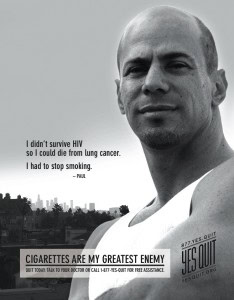Quit Smoking? Smoking has long been associated with a comfort and security. Have a cigarette and cup of coffee in the morning. Sit out on a patio with a group of friends. For the LGBT community, growing up can be isolating as we can have a more difficult time finding our community, our place. Perhaps this is one of the reasons that gays and lesbians smoke at a disproportionately higher rate. One in five members of the LGBT community are smokers where only one in seven in the heterosexual community are smokers. What will it take for us to quit smoking?
Hannah grew up in a home where neither of her parents discussed smoking. Yet, she recalls smelling cigarettes on her mother’s breath as her mother tucked her into bed at night. As smoking was taboo in her home, Hannah just associated it as a “mysterious” mother smell that would never be discussed or mentioned. They must have quit smoking before she grew up.
Hannah smoked her first cigarette while at a high school party. “All the cool kids were smokers, obviously,” she shared with sarcastic emphasis and a sly grin. Having attended a “very wealthy” high school, she looks back with a bit of disdain at that crowd now. She had a visceral reaction after her first cigarette. She knew that smoking would get her out of any social situation which she characterized as “amazing.” Hannah suffered from terrible social anxiety and was “super awkward” so smoking became an easy escape hatch. Smoking gave her the ability to remove herself from groups and situations.
Hannah – Excuse of Smoking from L Style G Style on Vimeo.
In college, it had the opposite impact on her social life. Smoking now helped her form social relationships that then evolved into real relationships and real friendships. Now she shifts her thoughts to quit smoking.
When thinking about quitting, Hannah shares an exercise she recently completed in college. The exercise was about setting and accomplishing goals. The professor had the class put down goals they wished to achieve in the course of six moths, one year and in five years. She realized that she didn’t mention smoking on the six month or one year list of goals, but did document that she wished to quit within five years.
When pressed on why she likely wouldn’t start the process of quitting until five years from now, Hannah gave an informed excuse. Upon graduation this May, she is planning to move to Seattle and join up with friends. Perhaps being a bit too realistic, Hannah is expecting the move to be rough as the majority of her friends have struggled through their individual moves to Seattle. “All of my friends who have moved there are having terrible times trying to get on their feet doing theatre.”
That five year mark is what Hannah is budgeting to “even her life out” and get on stable ground. Until then, smoking and cigarettes, with all of their potentially negative and harmful impacts, will remain a constant and a control in a world of change and uncertainty.
For more information and statistics surrounding smoking including resources to help smokers quit, please visit yesquit.org.






































